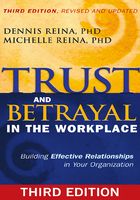
Preface
This book is about trust: the power when it exists, the pain when it's betrayed, and the transformation that occurs when it's been renewed. Our purpose in completely rewriting the third edition of this book is to help people at all levels—not just leaders—of any organization create, support, and, if necessary, rebuild trust within themselves and with others.
This book is about creating more productive, engaging, and rewarding work environments for everyone. It's about relationships that are built on trust and infused with spirit—relationships that inspire leaders and employees alike. The principles, tools, and techniques offered in Trust and Betrayal in the Workplace apply to anyone, in any kind of relationship, at any level of responsibility, and in any kind of setting—both at work and at home.
More than ever, there is a need for trust in workplace relationships. Organizations and people face increasing challenges; some associated with growth and expansion, others with downsizing or restructuring. Although change and transition have become commonplace, our need for trust-based relationships endures. Why? Because of one simple truth: business is conducted through relationships and trust is the foundation of effective relationships. Trust builds the bridge between the business need for results and the human need for connection.
Trust is foundational to how you bring yourself to your work and your relationships. Yet, trust is fragile. It takes time to develop, is easy to lose, and is hard to regain. Countless numbers of people in the workplace today suffer from the loss of trust. In fact, after decades of constant change—years of downsizing, restructuring, and reengineering, or of mergers and growth—trust among people at every organizational level is needed more than ever.
You're not immune to this reality. You've personally felt the pain of breached trust from minor letdowns and disappointments. You may even have suffered a major betrayal by another's self-serving action. Unmet expectations, letdowns, broken trust, and even betrayals crop up every day on the job. The hard truth is, these situations impact your performance and the performance of your colleagues.
You can counteract this downward spiral of broken trust and diminished effectiveness by learning to trust more in yourself and others. You can develop caring, genuine relationships based on mutually trustworthy intentions. You can benefit from inspired collaboration, improved performance, and a renewed ability to find joy in your relationships—both at work and at home. You can do these things. Trust begins with you.